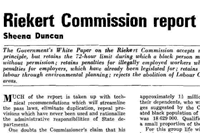This Day in History: May 8, 1979
Additional Date: May 8, 1979
The Riekert Commission was established in response to a crisis faced by the apartheid state, as South African capitalism has been facing its deepest recession since the Second World War. Consequently, the regime was trying to find ways of increasing productivity and profitability for South African industry.
In addition, political resistance by the Black opposition organisations and the new independent unions increased during the 1970s, particularly after a wave of worker's strikes. The government realised that workers unions had staying power and could not be crushed. Therefore, companies and the government had to find a way to allow Black workers to belong to trade unions, but at the same time ensure that they did not become a political force.
As a result, the government set up a Commission of Inquiry into Labour Legislation in 1977. This became known as the Wiehahn Commission, and its most widely publicized recommendation was the call for the registration of African trade unions. The apartheid regime tried to promote this move as an end to racial discrimination in the industrial relations field, but the purpose of registering African unions was actually to control them.
The Nationalist Party recognised that if they granted trade union rights to black workers it would have to make major adjustments to the influx control system. Therefore, in addition to the Wiehahn commission, the government appointed the Riekert Commission to consider ways of adapting the influx control laws to meet rapidly changing economic and political challenges. The Riekert Commission was named after its chairman and sole member, Dr P. Riekert, a former economic advisor to ex-Prime Minister John Vorster.
On 8 May 1979, the recommendations of the Riekert Commission were published. It recommended that those Black workers already living in urban areas (and who had residential rights to do so) should receive 'preferential treatment' when seeking employment. The aim was to create a stable labour force and encourage the creation of a 'Black urban middle-class'.
Black workers who did not have residential rights were to be kept out of urban areas by a stricter enforcement of influx control. The report also recommended the removal of the '72-hour' rule (the period during which a Black man could look for work in urban areas) for 'qualified' Black workers. Non-qualified, or migrant workers, would be required to find employment by first registering at 'assembly centres', which were to be established along the border of their "homelands".
The recommendations of the commission were only partially implemented due to prohibitive costs, as no alteration of the system would satisfy capital, militant trade unions, internal political opposition and contrary world opinion. According to Sheena Duncan, as quoted in the South African Labour Bulletin:
"The Riekert report is a very clever and highly sophisticated piece of work which will probably result in a longer period in which the status quo will be maintained through the creation of a relatively small African privileged group which may serve as a buffer against unrest. In the interim, dreadful human suffering in the homelands and problems experienced by migrant and non-permanent workers will increase".
